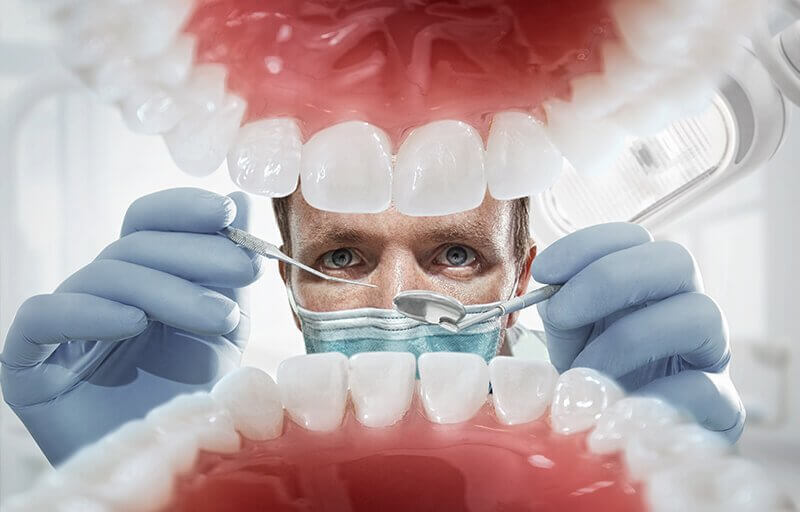Replacing any missing teeth is a top dental priority. While dentures are an effective solution, they can also be expensive. What should you do if you need dentures but don’t have enough money to buy them? Let’s take a look at what type of dentures you might need and what options are available to make them affordable.
What Problems Do Dentures Solve?
Missing teeth are more than just an inconvenience. Instead, gaps in your smile can affect your ability to eat and talk. Plus, missing teeth increase your risks of developing infections, dental decay and gum disease. Over time, remaining teeth will start to shift into the open spaces. This can affect your bite alignment and even result in a sagging appearance.
Missing teeth are replaced with either dental implants or dentures. Implants are permanently fixed into your jaw, while dentures are removable. Dentures and implants both have different advantages and disadvantages. Your dentist will work with you to develop the best solution for your needs. Generally, dentures are the more affordable option.
Types of Dentures
Dentures can be either full or partial. Full dentures replace an entire mouth of missing teeth while partials are used to fill gaps between existing natural teeth.
Dentures are made from either acrylic or porcelain. Acrylic is the most durable material. Porcelain is a bit more expensive but also has a more natural appearance.
What Do Dentures Cost?
Denture costs typically range from about $300 to $5,000 for a single plate. Factors which affect price include the materials used, whether the dentures are custom-fit to your gums (some dentures that are advertised as “budget” or “cheap” are premade and then adapted to fit your mouth, they are unlikely to ever function as well as a custom-made set) any dental coverage you may have and other issues.
You’ll also need to factor in fitting costs. For custom-fit intermediate dentures, you’ll have one or two visits to the dentist for full x-rays and impressions. You will likely have a try-on, and then an appointment for your extractions, followed by at least one post-procedure checkup. You’ll likely have to go back to your dentist at least once (for some people, it’s every week for the first few weeks) to have your dentures adjusted as your gums heal. Typically, the dentist will not charge you for the first adjustment visits. You repeat this process, without the extractions, when you get your permanent set.
One thing that will significantly raise the final price is whether you want implant-secured dentures. Most dentists strongly recommend using mini-implants to secure lower dentures, but this can cost $4000-$5000 more than the price of the dentures themselves. However, if you can afford it, implant-secured dentures are often well-worth the additional cost.
Your dentist will also want to check your dentures annually. He or she will look for any damage to the dentures. The fit might also need to be readjusted as the shape of your gums can change over time. Plan on replacing your dentures entirely about every 10 years.
How Can Dentures Be More Affordable?
Certain types of dental coverage can help reduce the cost of dentures – while others are unlikely to be much help.
- Dental Insurance: Dental insurance can help pay for dentures but there are some potential limitations. Many policies don’t cover replacement for any teeth which were missing before the policy was purchased. Even if dentures are covered, there may be curbs on the types of materials used and overall quality. Your dental policy’s annual limit – typically $1500 – will also affect how much you can save.
- Medicaid: States provide different levels of coverage. Some states will provide for emergency care that is medically necessary such as temporary dentures. Medicaid typically only provides coverage for low-quality dentures, if coverage is provided at all. Coverage for maintenance and repair will also likely be limited.
- Medicare: The risk of tooth loss increases with age. Tens of millions of seniors rely on Medicare for medical coverage. Unfortunately, Medicare does not provide dental coverage except in rare emergency situations involving damage to the face. Private health insurance plans also typically do not cover dental, but some Medicare Advantage plans do. Here again though (see “Dental Insurance” directly above), you’ll be dealing with annual spending limits and other restrictions.
- Dental Savings Plans: Also called dental discount plans, these plans offer savings at hundreds of thousands of participating dentist’s offices nationwide. Discounts are available on many different procedures often including dentures and related dental care. Discount plans have no restrictions on any dental issues you had before purchasing the plan, so you can save even if you currently have missing teeth. Plus, savings are available within just a few days after joining the plan. If you recently learned you need dentures, a discount plan can help you save right away. Typically, members of dental savings plans get a 20% discount on the total cost of dentures.
Final Thoughts on Affordable Dentures
Don’t let missing teeth continue to damage your oral health. Dentures are an easy and effective solution that can be affordable. Even though your new teeth are artificial, an affordable set of dentures is sure to put a real a smile on your face!


